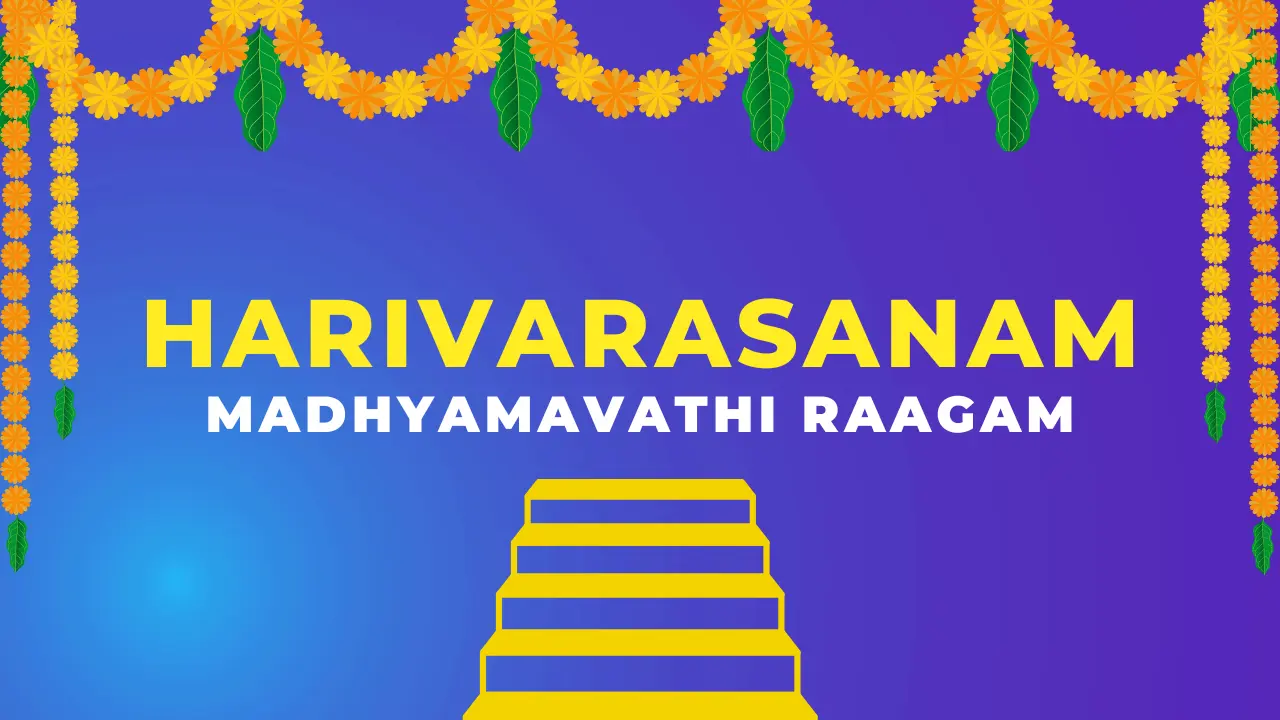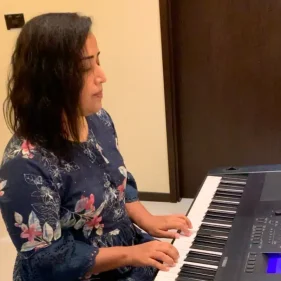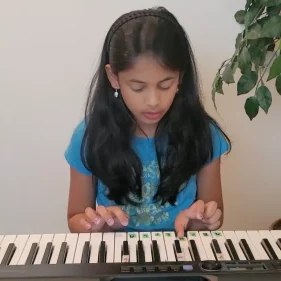- Introduction
- Harivarasanam Ragam: Madhyamavathi
- Genesis of Harivarasanam
- Who Wrote Harivarasanam?
- Harivarasanam Composer
- Harivarasanam – A Gist
- Harivarasanam – Lyrics and Notations
- Harivarasanam Lyrics in English
- Harivarasanam Lyrics in Tamil
- Harivarasanam Lyrics in Kannada
- Harivarasanam Lyrics in Malayalam
- Harivarasanam Lyrics in Telugu
- What is the Meaning of Harivarasanam?
- Harivarasanam Notations
- How to Sing Harivarasanam in its Ragam?
- Final Thoughts
- FAQs
Introduction
Harivarasanam is a famous Malayalam song on the Lord Ayyapan that has fame and name around the world. Harivarasanam was composed by Kumbakudi Kulathur Iyer who penned the lyrics with the tune credited to G. Devarajan. Harivarasanam lyrics along with the notations are in this blog.
Manipravalam is a term, which means Sanskritised Malayalam. Harivarasanam is a song in Sanskritised Malayalam and it comes under the category of Manipravalam Ashtakam.

The main measure of your devotion to God is not your devotional life. It is simply your life.
This song is a lullaby, and people sing this song in Ayyapan temples when they close the temple for the night. There is a traditional version of the song, that people sing inside the temple during the closing ceremony. There is a famous version of this song, by K.J.Yesudas, which is played for the devotees outside the temple.
Harivarasanam Ragam: Madhyamavathi
If you are wondering which raga Harivarasanam is composed in, I’ve the answer: Raagam Madhyamavathi. This Raagam has five musical notes and it is an Audava raagam. It is in pentatonic scale in other words. Madhyamavathi is a Janya Raagam, derived from Kharaharapriya, which is the 22nd Melakartha Raagam.
The speciality of this raagam is that it can be derived from other Raagams as well. Charukesi, Natabhairavi or Hari Kambhoji, can also be the parent Raagams, if we drop the Ghandaram (Ga) and Dhaivatham (Dha). Hindustani Raagas, Madhumad Sarang, Megh Malar and Megh are the equivalent of the Raagam Madhyamavathi.
Since the song is composed in Madhyamavati, the Harivarasanam Carnatic notes would be anywhere between the following scale:
- Aarohanam (Ascending scale) : s r2 m1 p n2 S
- Avarohanam (Descending scale) S n2 p m1 r2 s
- R2 denotes Chatushruti Rishabham
- M1 denotes Shuddha Madhyamam
- N2 denotes Kaisiki Nishadam
s denotes the lower s representing the base note of the scale and S denotes the highest note of the scale.
The western equivalent of the notes for Harivarasanam keyboard notes and Harivarasanam piano notes would be as follows if you keep C scale as your base note:
- Chatushruti Rishabham, i.e., R2 is G.
- Shuddha Madhyamam, i.e., M1 is A#.
- Kaisiki Nishadham, i.e., N2 is E.
Harivarasanam ragam in Hindustani music, i.e., Madhyamavati, is Madhumad Sarang. It is considered as an auspicious raga and is mostly performed as the final raga of a concert. Chatushruti Rishabham in Hindustani is Shuddh Rishaba and Kaisiki Nishadham is Komal Nishad. However, Shuddha Madhayamam is characterised with the same name.
Genesis of Harivarasanam
Harivarasanam is of the mystical songs in the history of Carnatic Music. The mysticism around the song is mainly due to Lord Ayyapan’s history. At 16, he ventured into the forest to get milk from a tigress for an ailment at home. Though being the son of a King, he chose to live for the people, and vowed to be a gatekeeper of the people for eternity.
The exact author of the song is not known, because of the tradition followed back then. The traditional way of submitting devotional works to the temples, did not have the practice of the author signing the song with their name. Swami Vimochananda, is the first person to sing this song in the temple at Sabarimala in 1950’s and the tradition continues till date.

Did You Know?
Traditionally, ragas were associated with specific times of day and seasons of the year, and they were thought to have supernatural effects such as bringing rain or causing fire.
Who Wrote Harivarasanam?
Legends agree that the Harivarasanam song was first penned by Kambangudi Kulathur Srinivasa Iyer and sung by Swami Vimochanananda for the first time at Sabarimala. However, the version we hear as the closing song, a.k.a., Urakkapattu resonating across the temple today is composed by G Devarajan, sung in the deep voice of Kerala’s renowned vocalist, K J Yesudas, that featured in the Swami Ayyappan film, in the year 1975.
Harivarasanam Composer
Harivarasanam’s original composer is a topic of debate. The original claim for the song falls on the shoulders of Kambankudi Kulathu Iyer, as he has a collection of devotional songs credited to his name. The collection’s name is “Harivarasanam Vishvamohanam”.
The other claim that is widely in the air is, Konnakathu Janaki Amma as the composer of the song. This song came into existence because of her father, Ananthakrishna Iyer, who was the Mel Shanthi, or the chief priest of Sabarimala, the abode of Lord Ayyappan. The claims go on to the extent of them having hand-written notes from the author herself.
Harivarasanam – A Gist
Harivarasanam lyrics talk about the beauty, love, charisma, endeavors, and the heart of Lord Ayyapan. It talks about how he is the revered son of Sastha, how majestically he rides the horse, how glowing he is with his divinity, how he wields the mace so gracefully, how all the devas worship him, and much more. Each stanza in the Harivarasanam lyrics ends with the line that whoever is singing the song, takes refuge in him.
Harivarasanam – Lyrics and Notations
What are the notes of Harivarasanam ragam? The Harivarasanam notation is set in the ragam Madhyamavathi, structured as an Asktakam, comprising 8 stanzas, 32 lines and 108 words, totaling 352 letters.
Raagam : Madhyamavathi
Tala: Adi
Aro: S R2 M1 P N2 Ṡ
Ava: Ṡ N2 P M1 R2 S
Harivarasanam Lyrics in English
Stanza-1
Harivarasanam Vishwamohanam
Haridatheeswaram Aradyapadukam
Arivimardhanam Nityanarthanam
Hariharathmajam Devamasraye
Saranam Ayyappa Swami Saranam Ayyappa
Saranam Ayyappa Swami Saranam Ayyappa
Stanza-2
Saranakeerthanam Sakthamanasam
Paranalolupam Narthanalasam
Arunabasuram Boothanayakam
Hariharathmajam Devamasraye
(Saranam ayyapa)
Stanza-3
Duragavahanam Sundarananam
Varagadayutham Vedavarnitham
Gurugrupagaram Keerthanapriyam
Hariharathmajam Devamasraye
(Saranam ayyapa)
Stanza-4
Tribhuvanarchitam Devadatmagam
Thrinayanamprabu Divyadeshikam
Dritasaphujitham Cindithapratham
Hariharathmajam Devamasraye
(Saranam)
Stanza-5
Bhavapayapaham Bhaukavaham
Bhuvanamohanam Bhootiphushanam
Thavalavahanam Divyavaranam
Hariharathmajam Devamasraye
(Saranam ayyapa)
Stanza-6
Kalamruthushmitam Sundarananam
Kalapakomalam Kathramohanam
Kalapakesari Vajivahanam
Hariharathmajam Devamasraye
(Saranam ayyapa)
Stanza-7
Shrudhajanapriyam Cindithapratam
Shrutivibhushanam Satujeevanam
Shruthimanoharam Geethalalasam
Hariharathmajam Devamasraye
(Saranam ayyapa)
Harivarasanam Lyrics in Tamil
ஹரிவராசனம் விஸ்வமோகனம்
ஹரிததீஸ்வரம் ஆராத்யபாதுகம்
அரிவிமர்த்தனம் நித்யநர்த்தனம்
ஹரிஹராத்மஜம் தேவமாஷ்ரயே
சரணகீர்த்தனம் பக்தமானஸம்
பரணலோலுபம் நர்த்தனாலயம்
அருணபாசுரம் பூதநாயகம்
ஹரிஹராத்மஜம் தேவமாஷ்ரயே
பிரணயசத்யகம் பிராணநாயகம்
ப்ரணதகல்பகம் சுப்ரபாஞ்சிதம்
பிரணவமந்திரம் கீர்த்தனப்பிரியம்
ஹரிஹராத்மஜம் தேவமாஷ்ரயே
துரகவாகனம் சுந்தரானனம்
வரகதாயுதம் தேவவர்ணிதம்
குருகிருபாகரம் கீர்த்தனப்பிரியம்
ஹரிஹராத்மஜம் தேவமாஷ்ரயே
திரிபுவனார்ச்சிதம் தேவதாத்மகம்
திரிநயன பிரபும் திவ்யதேசிகம்
திரிதசப்பூஜிதம் சிந்திதப்பிரதம்
ஹரிஹராத்மஜம் தேவமாஷ்ரயே
பவபயாபகம் பாவுகாவகம்
புவனமோகனம் பூதிபூசணம்
தவளவாகனம் திவ்யவாரணம்
ஹரிஹராத்மஜம் தேவமாஷ்ரயே
களம்ருதுஸ்மிதம் சுந்தரானனம்
களபகோமளம் காத்ரமோகனம்
களபகேசரி வாஜிவாகனம்
ஹரிஹராத்மஜம் தேவமாஷ்ரயே
ச்ரிதஜனப்ரியம் சிந்திதப்ரிதம்
ச்ருதிவிபூஷணம் சாதுஜீவனம்
ச்ருதிமனோகரம் கீதலாலசம்
ஹரிஹராத்மஜம் தேவமாஷ்ரயே
சரணம் ஐயப்பா
சுவாமி சரணம் ஐயப்பா
சரணம் ஐயப்பா
சுவாமி சரணம் ஐயப்பா
சரணம் ஐயப்பா
சுவாமி சரணம் ஐயப்பா
சரணம் ஐயப்பா
சுவாமி சரணம் ஐயப்பா
Harivarasanam Lyrics in Kannada
ಶರಣಂ ಅಯ್ಯಪ್ಪಾ ಸ್ವಾಮಿ ಶರಣಂ ಅಯ್ಯಪ್ಪಾ |
ಶರಣಂ ಅಯ್ಯಪ್ಪಾ ಸ್ವಾಮಿ ಶರಣಂ ಅಯ್ಯಪ್ಪಾ ||
ಹರಿವರಾಸನಂ ವಿಶ್ವಮೋಹನಮ್
ಹರಿದಧೀಶ್ವರಂ ಆರಾಧ್ಯಪಾದುಕಮ್ |
ಅರಿವಿಮರ್ದನಂ ನಿತ್ಯನರ್ತನಮ್
ಹರಿಹರಾತ್ಮಜಂ ದೇವಮಾಶ್ರಯೇ || 1 ||
ಶರಣಂ ಅಯ್ಯಪ್ಪಾ ಸ್ವಾಮಿ ಶರಣಂ ಅಯ್ಯಪ್ಪಾ |
ಶರಣಂ ಅಯ್ಯಪ್ಪಾ ಸ್ವಾಮಿ ಶರಣಂ ಅಯ್ಯಪ್ಪಾ ||
ಶರಣಕೀರ್ತನಂ ಭಕ್ತಮಾನಸಮ್
ಭರಣಲೋಲುಪಂ ನರ್ತನಾಲಸಮ್ |
ಅರುಣಭಾಸುರಂ ಭೂತನಾಯಕಮ್
ಹರಿಹರಾತ್ಮಜಂ ದೇವಮಾಶ್ರಯೇ || 2 ||
ಪ್ರಣಯಸತ್ಯಕಂ ಪ್ರಾಣನಾಯಕಮ್
ಪ್ರಣತಕಲ್ಪಕಂ ಸುಪ್ರಭಾಂಚಿತಮ್ |
ಪ್ರಣವಮಂದಿರಂ ಕೀರ್ತನಪ್ರಿಯಮ್
ಹರಿಹರಾತ್ಮಜಂ ದೇವಮಾಶ್ರಯೇ || 3 ||
ಶರಣಂ ಅಯ್ಯಪ್ಪಾ ಸ್ವಾಮಿ ಶರಣಂ ಅಯ್ಯಪ್ಪಾ |
ಶರಣಂ ಅಯ್ಯಪ್ಪಾ ಸ್ವಾಮಿ ಶರಣಂ ಅಯ್ಯಪ್ಪಾ ||
ತುರಗವಾಹನಂ ಸುಂದರಾನನಮ್
ವರಗದಾಯುಧಂ ವೇದವರ್ಣಿತಮ್ |
ಗುರುಕೃಪಾಕರಂ ಕೀರ್ತನಪ್ರಿಯಮ್
ಹರಿಹರಾತ್ಮಜಂ ದೇವಮಾಶ್ರಯೇ || 4 ||
ತ್ರಿಭುವನಾರ್ಚಿತಂ ದೇವತಾತ್ಮಕಮ್
ತ್ರಿನಯನಪ್ರಭುಂ ದಿವ್ಯದೇಶಿಕಮ್ |
ತ್ರಿದಶಪೂಜಿತಂ ಚಿಂತಿತಪ್ರದಮ್
ಹರಿಹರಾತ್ಮಜಂ ದೇವಮಾಶ್ರಯೇ || 5 ||
ಶರಣಂ ಅಯ್ಯಪ್ಪಾ ಸ್ವಾಮಿ ಶರಣಂ ಅಯ್ಯಪ್ಪಾ |
ಶರಣಂ ಅಯ್ಯಪ್ಪಾ ಸ್ವಾಮಿ ಶರಣಂ ಅಯ್ಯಪ್ಪಾ ||
ಭವಭಯಾಪಹಂ ಭಾವುಕಾವಕಮ್
ಭುವನಮೋಹನಂ ಭೂತಿಭೂಷಣಮ್ |
ಧವಳವಾಹನಂ ದಿವ್ಯವಾರಣಮ್
ಹರಿಹರಾತ್ಮಜಂ ದೇವಮಾಶ್ರಯೇ || 6 ||
ಕಳಮೃದುಸ್ಮಿತಂ ಸುಂದರಾನನಮ್
ಕಳಭಕೋಮಲಂ ಗಾತ್ರಮೋಹನಮ್ |
ಕಳಭಕೇಸರೀವಾಜಿವಾಹನಮ್
ಹರಿಹರಾತ್ಮಜಂ ದೇವಮಾಶ್ರಯೇ || 7 ||
ಶರಣಂ ಅಯ್ಯಪ್ಪಾ ಸ್ವಾಮಿ ಶರಣಂ ಅಯ್ಯಪ್ಪಾ |
ಶರಣಂ ಅಯ್ಯಪ್ಪಾ ಸ್ವಾಮಿ ಶರಣಂ ಅಯ್ಯಪ್ಪಾ ||
ಶ್ರಿತಜನಪ್ರಿಯಂ ಚಿಂತಿತಪ್ರದಮ್
ಶ್ರುತಿವಿಭೂಷಣಂ ಸಾಧುಜೀವನಮ್ |
ಶ್ರುತಿಮನೋಹರಂ ಗೀತಲಾಲಸಮ್
ಹರಿಹರಾತ್ಮಜಂ ದೇವಮಾಶ್ರಯೇ || 8 ||
ಶರಣಂ ಅಯ್ಯಪ್ಪಾ ಸ್ವಾಮಿ ಶರಣಂ ಅಯ್ಯಪ್ಪಾ |
ಶರಣಂ ಅಯ್ಯಪ್ಪಾ ಸ್ವಾಮಿ ಶರಣಂ ಅಯ್ಯಪ್ಪಾ ||
Harivarasanam Lyrics in Malayalam
ഹരിവരാസനം വിശ്വമോഹനം
ഹരിദധീശ്വരം ആരാധ്യപാദുകം
അരി വിമര്ദ്ദനം നിത്യ നര്ത്തനം
ഹരിഹരാത്മജം ദേവമാശ്രയേ
ശരണ കീര്ത്തനം ഭക്തമാനസം
ഭരണലോലുപം നര്ത്തനാലസം
അരുണഭാസുരം ഭൂതനായകം
ഹരിഹരാത്മജം ദേവമാശ്രയേ
പ്രണയസത്യകം പ്രാണനായകം
പ്രണതകല്പകം സുപ്രഭാഞ്ചിതം
പ്രണവ മന്ദിരം കീര്ത്തനപ്രിയം
ഹരിഹരാത്മജം ദേവമാശ്രയേ
തുരഗവാഹനം സുന്ദരാനനം
വരഗദായുധം വേദവർണ്ണിതം
ഗുരുകൃപാകരം കീര്ത്തനപ്രിയം
ഹരിഹരാത്മജം ദേവമാശ്രയേ
ത്രിഭുവനാര്ച്ചിതം ദേവതാത്മകം
ത്രിനയനം പ്രഭും ദിവ്യദേശികം
ത്രിദശപൂജിതം ചിന്തിതപ്രദം
ഹരിഹരാത്മജം ദേവമാശ്രയേ
ഭവഭയാവഹം ഭാവുകാവഹം
ഭുവനമോഹനം ഭൂതിഭൂഷണം
ധവളവാഹനം ദിവ്യവാരണം
ഹരിഹരാത്മജം ദേവമാശ്രയേ
കളമൃദുസ്മിതം സുന്ദരാനനം
കളഭകോമളം ഗാത്രമോഹനം
കളഭകേസരി വാജിവാഹനം
ഹരിഹരാത്മജം ദേവമാശ്രയേ
ശ്രിതജനപ്രിയം ചിന്തിതപ്രദം
ശ്രുതിവിഭൂഷണം സാധുജീവനം
ശ്രുതിമനോഹരം ഗീതലാലസം
ഹരിഹരാത്മജം ദേവമാശ്രയേ
ശരണമയ്യപ്പാ സ്വാമി
ശരണമയ്യപ്പാ
ശരണമയ്യപ്പാ സ്വാമി
ശരണമയ്യപ്പാ
ശരണമയ്യപ്പാ സ്വാമി
ശരണമയ്യപ്പാ
ശരണമയ്യപ്പാ സ്വാമി
ശരണമയ്യപ്പാ
Harivarasanam Lyrics in Telugu
హరివరాసనం విశ్వమోహనం
హరిదదిస్వరం ఆరాధ్యపాదుకం
అరివిమర్థనం నిత్యనర్తనం
హరిహరాత్మజం దేవమాశ్రయే
శరణకీర్తనం భక్తమానసం
భరణలోలుపం నర్తనాలసం
అరుణభాసురం భూతనాయకం
హరిహరాత్మజం దేవమాశ్రయే
ప్రణయసత్యకం ప్రాణనాయకం
ప్రణతకల్పకం సుప్రభాన్చితం
ప్రణవమందిరం కీర్తనప్రియం
హరిహరాత్మజం దేవమాశ్రయే
తురగవాహనం సుందరాననం
వరగదాయుధం వేదవర్ణితం
గురు కృపాకరం కీర్తనప్రియం
హరిహరాత్మజం దేవమాశ్రయే
త్రిభువనార్చనం దేవతాత్మకం
త్రినయనంప్రభుం దివ్యదేశికం
త్రిదశపూజితం చిన్తితప్రదం
హరిహరాత్మజం దేవమాశ్రయే
భవభయాపహం భావుకావహం
భువనమోహనం భూతిభూషణం
ధవలవాహనం దివ్యవారణం
హరిహరాత్మజం దేవమాశ్రయే
కళ మృదుస్మితం సుందరాననం
కలభకోమలం గాత్రమోహనం
కలభకేసరి వాజివాహనం
హరిహరాత్మజం దేవమాశ్రయే
శ్రితజనప్రియం చిన్తితప్రదం
శృతివిభూషణం సాధుజీవనం
శృతిమనోహరం గీతలాలసం
హరిహరాత్మజం దేవమాశ్రయే
శరణం అయ్యప్ప
స్వామి శరణం అయ్యప్ప
శరణం అయ్యప్ప
స్వామి శరణం అయ్యప్ప
శరణం అయ్యప్ప
స్వామి శరణం అయ్యప్ప
శరణం అయ్యప్ప
స్వామి శరణం అయ్యప్ప
What is the Meaning of Harivarasanam?
The translation of Harivarasanam is as follows:
Stanza 1
The first stanza praises Ayappan as the supreme god who sits on a Simhasana (a place where the royals are seated like the lion). He is referred to as the one who enchants the universe with his holy cosmic dance while destroying the evil enemies. The poet takes refuge from this lord who is the son of Hari representing Lord Shiva and the son of Hara representing Lord Vishnu.
Stanza 2
In the second verse of this ashtakam, the poet talks about Lord Ayappan’s greatness as the best ruler of the universe, who resides in the minds of his devotees, while dancing and shining like the golden sunrise, while taking refuge on Ayappa.
Stanza 3
The poet describes Ayappan as the ultimate truth who is loved by all the souls of the universe as he is the creator of the entire universe who shines like a shiny halo, while housing the pranava mandhiram, OM, with the love for music. He calls Ayappan, Hariharaputra, the son of Hari (Lord Shiva) and Haran(Lord Vishnu), while taking refuge on his feet.
Stanza 4
This para talks about Ayappa’s expertise on riding horses who looks magnificent like a prince on it. The lord is said to have a glorious mace as his weapon bestowed with the backing of vedas, with a musical indulgence, while the poet surrenders at Harihara’s feet, while indulging in music.
Stanza 5
The verse depicts Lord Ayappa revered by all the three worlds, hell, heaven and earth, being the soul of all the gods. The poet says He is worshipped by the god with three eyes denoting Lord Shiva and the Devas who rule the heaven, thrice a day as his very thought gives a sense of fulfilment.
Stanza 6
Let’s look at the crux of this verse in Harivarasanam. Ayappa is known to destroy fears, bringing prosperity to his devotees while mesmerizing the entire universe with his ash smeared body that he adorns as an ornament, and the one who rides the humble white elephant that belongs to Indra (the leader of Devas). The poet takes refuge at this beautiful god’s feet singing Swamy Sharanam Ayappa which literally translates to, “surrendering to Lord Ayappa”.
Stanza 7
This stanza describes Lord Ayappan’s looks as a beautiful face with an enigmatic smile, embellished with fragrant sandalwood paste while looking like a lion to elephants but riding a ferocious tiger with grace. The poet finishes this verse by surrendering to Swamy Ayappa.
Stanza 8
The final verse of Harivarasanam talks about Ayappan being His best version to all his devotees, who is honored by the Devas, and blessed by the hermits. He is referred as the true essence of all the four vedas and an ardent lover of music, to whom we all surrender.
As this is the last song that is sung as a lullaby, Harivarasanam is finished with a small prayer before closing down the temple for the day. This is called the Mangala Sthuthi which is as follows:
Panchadreeshwari Mangalam
Hariharapremakruthey Mangalam
Pinchalamkrutha Mangalam
Pranamathaam Chinthamane Mangalam
Panchasyadhwaja Mangalam
Thrujagadhamadhyaprabhoo Mangalam
Panchastropama Mangalam
Shruthisirolankaara Sanmangalam
Harivarasanam Notations
Listed below are the Harivarasanam Carnatic notes that can help both a singer and an instrumentalist to follow. However basic knowledge of Carnatic music will help you learn the song faster that comes with a deeper understanding of Harivarasanam ragam, Madhyamavathi, structured as an Asktakam, comprising 8 stanzas, 32 lines and 108 words, totaling 352 letters.
Stanza-1
N S S Sa S R | R M R S Sa ||
Harivarasanam Vishwamohanam
N S R S R S N P | P P R S S Sa ||
Haridatheeswaram Aradyapadukam
R M M Ma M M R S | R M M M M ||
Arivimardhanam Nityanarthanam
R M P P N P M R | M R S S S Sa ||
Hariharathmajam Devamasraye
N S S S R S R Ri Ri | M R M R S R M ||
Saranam Ayyappa Swami Saranam Ayyappa
P M P M R R R Ri | N S R R S S ||
Saranam Ayyappa Swami Saranam Ayyappa
Stanza-2
P P M P P P Ni N P | P P P P P M P M ||
Saranakeerthanam Sakthamanasam
P P R S S S N P | P P P P M P M ||
Paranalolupam Narthanalasam
P P N Ni N Ni S R S | P P P P M P M ||
Arunabasuram Boothanayakam
R M P P N P M R | M R S S S Saa…. ||
Hariharathmajam Devamasraye
N S S S R S R Ri Ri | M R M R S R M ||
Saranam Ayyappa Swami Saranam Ayyappa
P M P M R R R Ri | N S R R S S ||
Saranam Ayyappa Swami Saranam Ayyappa
Note: Repeat the same notes for Stanza 3,4 5 and 6 if you are an instrumentalist.
Balamuralikrishna was the epitome of Carnatic music in his time and he indeed left behind a legacy of New Raagams, Taalams and Compositions.
How to Sing Harivarasanam in its Ragam?
There are many ways you can sing Harivarasanam in its ragam, Madhyamavathi. Some of the easiest ways are to learn from online platforms like YouTube or Spotify where they teach you line by line. However, I’d recommend you to walk into Music Master and learn it from one of our tutors. This will help you learn the song faster with the right pronunciation and notice your progress, realtime.
Final Thoughts
Did you know that there is an Harivarasanam Award since 2012? Headed by the unanimous leaders of Government of Kerala and Travancore Devaswom Board, it is awarded to people who spread love and peace across Sabarimala, the land of Ayappan, through the power of music.
Learn Harivarasanam, that is known as Ayyappa’s lullaby at Sabarimala temple, from YouTube or the elderly who have been singing and hearing this for eons together. If you want to understand the depth of the raga and do your own improvisations, you need to walk into Music Master to sign up for a free demo class and go on step by step from Mayamalavagowlai Sarali Varisai to the pentatonic Madhyamavathi!
FAQs
What is Harivarasanam?
Harivarasanam is a famous song, that is about Lord Ayyappan, in Sanskritised Malayalam, known as Manipravalam.
What is the significance of Harivarasanam?
The Harivarasanam is a song that is sung during the closing ceremony in Sabari Malai temple. It is considered to be a lullaby for Lord Ayyapan.
Where can I listen to Harivarasanam?
The famous version of Harivarasanam is sung by K.J.Yesudas and we can listen to it on Youtube. Harivarasanam is also sung on a daily basis at SabariMalai during the time of temple closing.
Is Harivarasanam dedicated to a special Diety?
Yes, harivarasanam is dedicated to Lord Ayyapan, who is residing in Sabarimalai, according to popular beliefs.
Where can I find the notes and notations of the song Harivarasanam?
The notes and notations of the song Harivarasanam is given in the blog above.
Which raga is used in Harivarasanam?
The Harivarasanam ragam that we hear today in Sabarimala and every Ayappan temple is set in Madhyamavathi, an audava raga (pentatonic scale) comprising five notes. It is considered as the janya raga of 22nd Melakartha raga, Kharaharapriya. Madhyamavathi can be derived from other Melakartha ragas too including, Charukesi, Natabhairavi and Harikambhoji.
What is the story behind Harivarasanam?
Harivarasanam is a song that moves every Ayappan devotee unanimously especially during the “Sabarimala season” that commences between the months of October and January. Many sources confirm that Kumbakudi Kulathur Iyer used to sing this after the Athazapuja (Ayappa’s final meal of the day) from 1950. After a dreadful fire accident, most of the temple was rebuilt and Harivarasanam was revived by Swami Vimochanananda in 1955.
This song was sung by generations but got its popularity across South India and the world, after the depiction of god for the movie, Swami Ayyappan in 1975. Harivarasanam raga scale is composed in the Madhyamavathi that we hear today sung by the divine voice of K. J. Yesuda, composed by the late veteran, G. Devarajan.
Who are some famous singers of the Harivarasanam ragam?
When we think of Harivarasanam, the first voice that comes to our mind is K.J. Yesudas who had ruled the South Indian industry, both in classical and film music.
Some of the other famous versions that are worth mentioning are S.P. Balasubramanyam, Surya Gayathri, Sri Lalitha, and the live Bhajan version of Vijay Prakash.
What is the arohanam and avarohanam of Harivarasanam ragam?
Harivarasam is composed in Madhyamavati. The arohanam and avarohanam (ascending and descending notes of any given scale) of this raga are as follows:
Aarohanam (Ascending scale) : s r2 m1 p n2 S
Avarohanam (Descending scale) S n2 p m1 r2 s
r2 denotes Chatushruti Rishabham
m1 denotes Shuddha Madhyamam
n2 denotes Kaisiki Nishadam
s denotes the lower s representing the base note of the scale and S denotes the highest note of the scale.
What is the vadi and samvadi of Harivarasanam ragam?
Madhayamavati. The Hindustani Classical equivalent is Madhumad Sarang. In Hindustani music, each raga is identified with its vadi and samvadi which are the first important note and the second most important note that defines the respective scale. Hence, the vadi of Madhumad Sarang scale would be Rishabh and the samvadi would be Panchamam. Other equivalents of Madhyamavati also include Megh and Megh Malhar of Hindustani Music.
How to play Harivarasanam ragam on violin?
Learning the violin is said to be one of the toughest. However, when you know the basics, you can learn it using the notes that I have mentioned in this blog. Learning from a teacher is even better to keep track of your progress. Head over to Music Master for a free demo class and learn this beautiful lullaby at your own pace.
Related blog: Evvari Bodhana – Abhogi Ragam


























